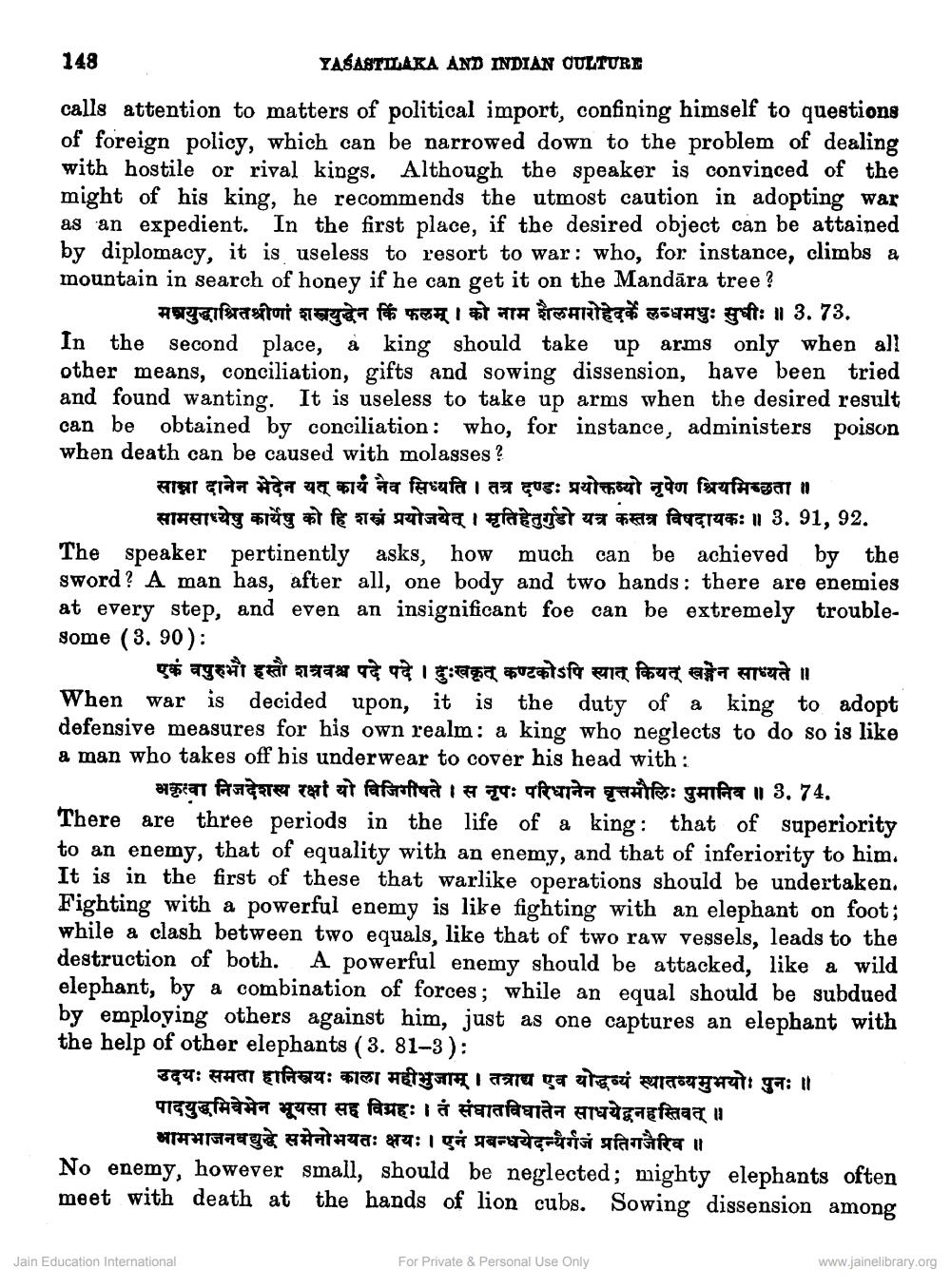________________
148
YASASTILAKA AND INDIAN CULTURE
calls attention to matters of political import, confining himself to questions of foreign policy, which can be narrowed down to the problem of dealing with hostile or rival kings. Although the speaker is convinced of the might of his king, he recommends the utmost caution in adopting war as an expedient. In the first place, if the desired object can be attained by diplomacy, it is useless to resort to war: who, for instance, climbs a mountain in search of honey if he can get it on the Mandara tree?
मन्त्रयुद्धाश्रितश्रीणां शस्त्रयुद्धेन किं फलम् । को नाम शैलमारोहेदर्के लब्धमधुः सुधीः ॥ 3. 73. In the second place, a king should take up arms only when all other means, conciliation, gifts and sowing dissension, have been tried and found wanting. It is useless to take up arms when the desired result can be obtained by conciliation: who, for instance, administers poison when death can be caused with molasses?
साम्ना दानेन भेदेन यत् कार्यं नैव सिध्यति । तत्र दण्डः प्रयोक्तव्यो नृपेण श्रियमिच्छता ॥
सामसाध्येषु कार्येषु को हि शस्त्रं प्रयोजयेत् । मृतिहेतुर्गुडो यत्र कस्तत्र विषदायकः ॥ 3. 91, 92.
The speaker pertinently asks, how much can be achieved by the sword? A man has, after all, one body and two hands: there are enemies at every step, and even an insignificant foe can be extremely troublesome (3.90):
एकं वपुरुभौ हस्तौ शत्रवश्च पदे पदे । दुःखकृत् कण्टकोऽपि स्यात् कियत् खङ्गेन साध्यते ॥ When war is decided upon, it is the duty of a king to adopt defensive measures for his own realm: a king who neglects to do so is like a man who takes off his underwear to cover his head with:
अकृत्वा निजदेशस्य रक्षां यो विजिगीषते । स नृपः परिधानेन वृत्तमौलिः पुमानिव ॥ 8. 74. There are three periods in the life of a king: that of superiority to an enemy, that of equality with an enemy, and that of inferiority to him. It is in the first of these that warlike operations should be undertaken. Fighting with a powerful enemy is like fighting with an elephant on foot; while a clash between two equals, like that of two raw vessels, leads to the destruction of both. A powerful enemy should be attacked, like a wild elephant, by a combination of forces; while an equal should be subdued by employing others against him, just as one captures an elephant with the help of other elephants (3. 81-3):
उदयः समता हानिस्त्रयः काला महीभुजाम् । तत्राद्य एव योद्धव्यं स्थातव्यमुभयोः पुनः ॥ पादयुद्धमिवेभेन भूयसा सह विग्रहः । तं संघातविघातेन साधयेद्वन हस्तिवत् ॥
आमभाजनबद्युद्धे समेनोभयतः क्षयः । एनं प्रबन्धयेदन्यैर्गजं प्रतिगजैरिव ॥
No enemy, however small, should be neglected; mighty elephants often meet with death at the hands of lion cubs. Sowing dissension among
Jain Education International
For Private & Personal Use Only
www.jainelibrary.org




